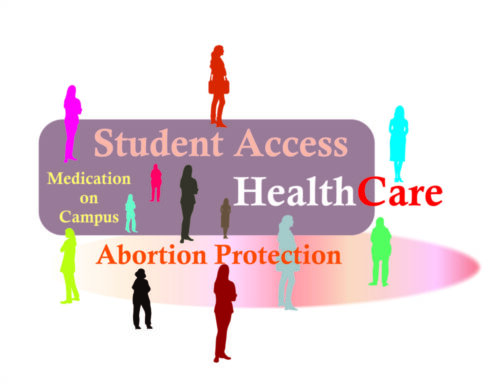Senate Bill 24 Offers Reproductive Protection to Some College Students in California
By Emma Pratt
Email espratt8@mail.ccsf.edu
By Jan. 1, University of California and California State University student health clinics will provide abortion medication on campuses, as mandated by Senate Bill 24.
The bill further protects the right to abortion in California, a timely measure as the constitutional right to abortion was overturned by the Supreme Court earlier this year.
“On a federal level, there’s a lot of movement to try to make it [abortion] illegal everywhere, you can never be too safe,” said Angelica Campos, a City College student who works at the Women’s Resource Center and is a student member of the college’s Participatory Governance Council. “Even in Orange County, there are already attacks against reproductive rights there, so you never know,” she added.

City of San Clemente Councilmember, Steve Knoblock, of Orange County, proposed a resolution which would limit access to abortion in San Clemente. The resolution never made it to the city council agenda, according to an article published in The Mercury News on Aug. 7.
Campos and Shella Cervantes, Women’s Resource Center advisor, recently distributed abortion information cards at student support centers on the Ocean Campus. The cards come from Plan C, a campaign that advocates for access to abortion medication in the United States.
Campos took the initiative to suggest having the cards on the Ocean Campus. “The way I see it is, just because it’s not there, not to take a radical stance, but if the program is not already existing [at City College], it’s kind of pushed off like, ‘oh, there’s no need,’” Campos said.
As a student and worker in the Women’s Resource Center, Campos has encountered the health needs of students. “A few times I’ve had students come and ask, ‘Do we have pregnancy testing?’ and those kinds of services, so I think in that general area, there are people looking for reproductive health-related treatment here at the college,” she said.
An estimated 865 to 1,109 community college students in California seek abortions each month, according to a 2021 study published in the Journal of American College Health. The number at UC and CSU campuses is about 500 students per month, according to the ACLU.
Since community colleges aren’t under the mandate, City College hasn’t been granted the funds that UC and CSU campuses have for abortion medication-related expenses. Senate Bill 24 grants each UC and CSU campus $200,000 for equipment and staffing, and another $200,000 for 24-hour telehealth services. The bill also provides funding for UC and CSU colleges through private donors, to be administered by the Commission on the Status of Women and Girls.
“They [student health center] would have to access the funds because it comes with funds to make it happen, and in general, we do not have enough funds to serve all of our students, we need more,” said Maggie Harrison, chair of the Women’s and Gender Studies department. “The financial part would be the limitation,” she added.
City College’s Student Health Center declined to answer questions and said that all media requests must go to the Vice-Chancellor, who did not respond to questions by the time
of this story’s publication.
“We’re playing catchup with this pandemic,” Cervantes said. “I haven’t been in conversations about access to this [abortion] medication yet. I don’t know how ready we are to work on that yet, especially since they aren’t going to give us funding through the law.”
Under the bill’s legislation, students will have to pay for the abortion medication itself. Senate Bill 24 only funds its availability on campuses.
The legislation text writes that the risks associated with traveling to get an abortion “negatively impact academic performance and mental health,” and by providing abortion medication on campuses, these risks can be mitigated.
“I think it’s good for supporting students who might not have as much access to it outside of campus, and just making it more accessible so people are really able to take advantage of the support. And I think it’s really cool that it’s going to be through school now, so people who may be too young or may not have documentations are able to reap the benefits,” said Livi Grace, a student at City College who is studying early childhood development to become a teacher.
Campos agreed. “I think we really need it [abortion medication],” she said.“I think we need that service, because like I said, we already have pregnancy testing, we already have these kinds of basic services, why not add one more thing to help college life be easier, because sometimes you can’t go to any of the hospitals in the city and try to get back to class in time.”
“It’s easier to get those services in your community,” she added.
Several Women’s and Gender studies courses WGST 25, WGST 54, and WGST 55, “offer a curriculum that addresses reproductive rights, reproductive freedom, and reproductive justice,” Harrison said.
Health department course HLTH 25 is also valuable in this area. “If you want to learn about women’s health, particularly related to reproduction, I think the women’s health classes would be a great resource for students,” Harrison added.
